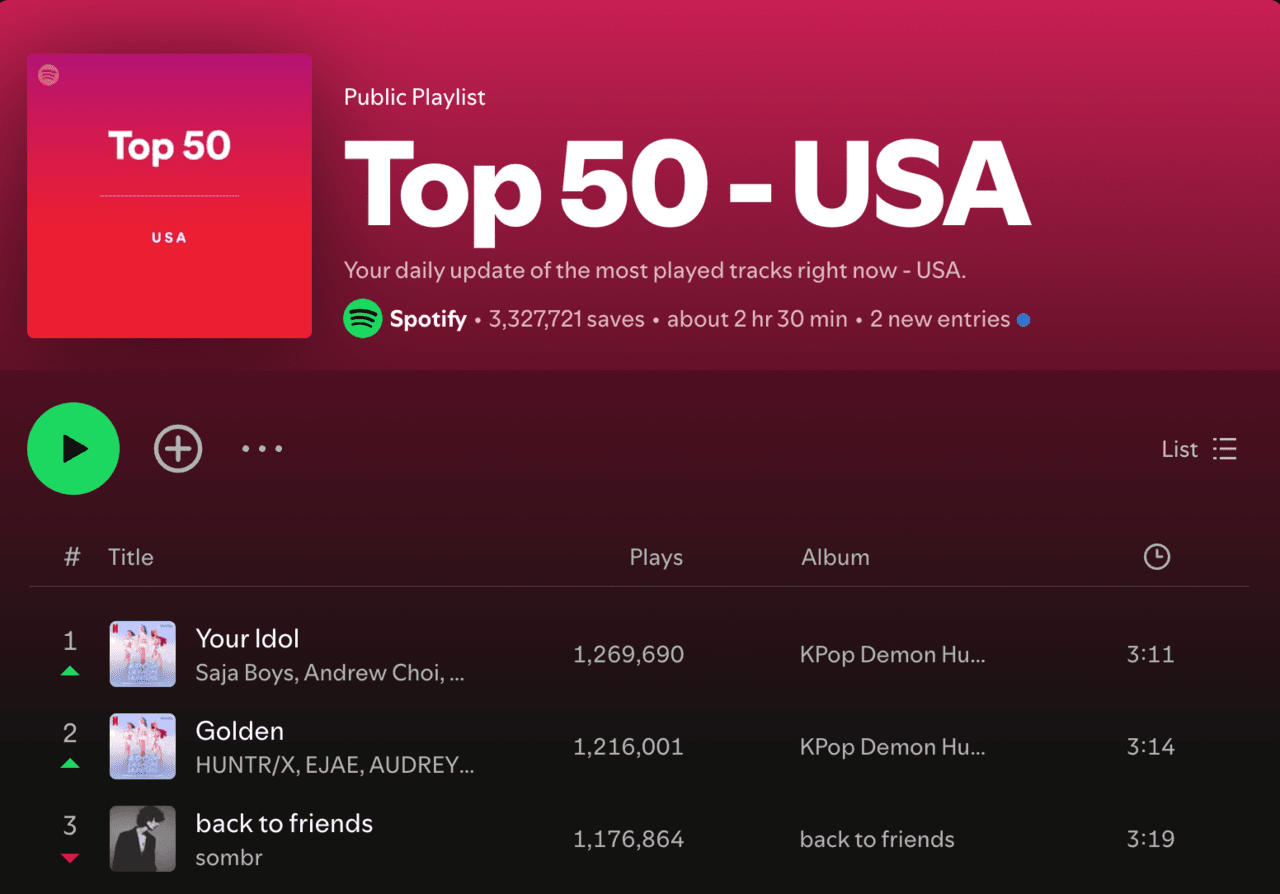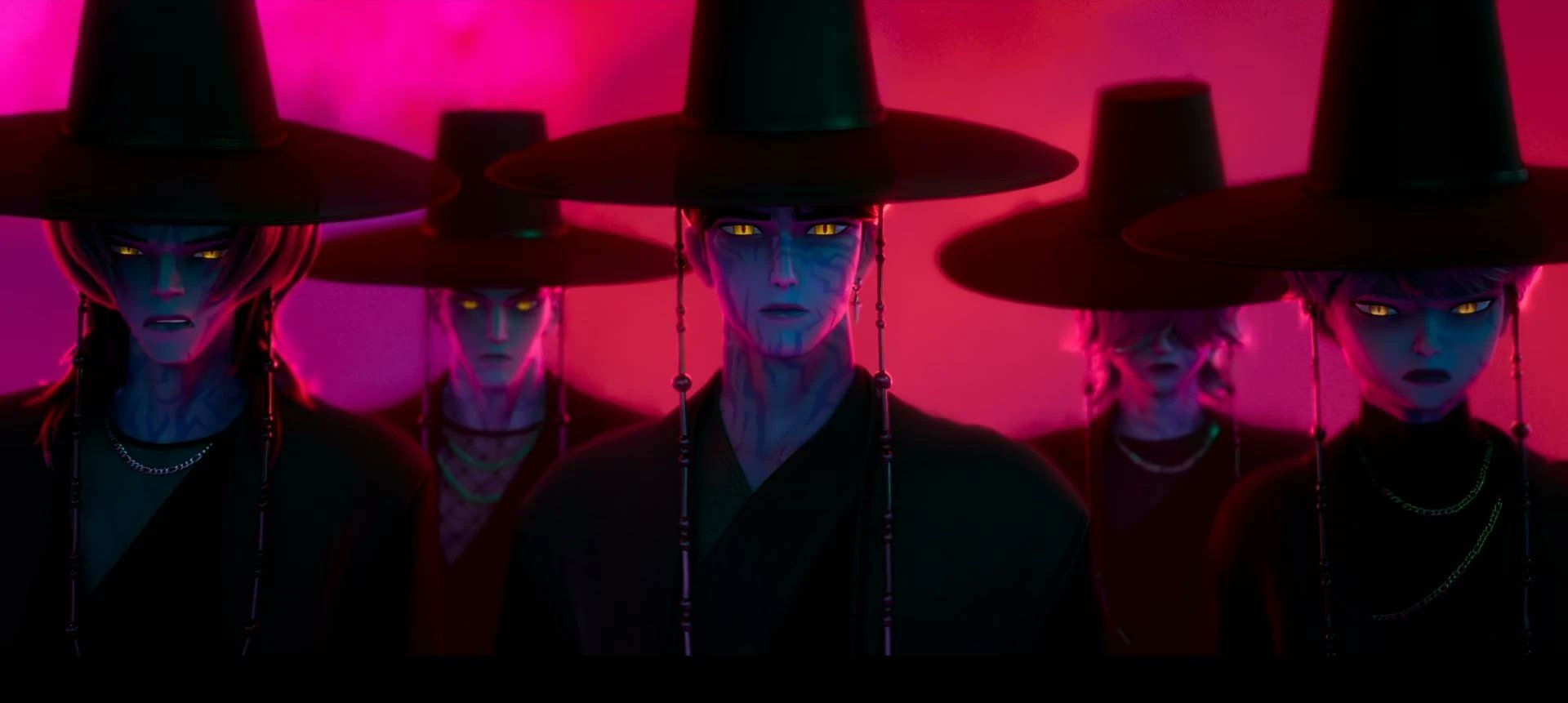Netflix's hit animated film K-Pop Demon Hunters isn't some happy coincidence. It's a calculated, data-oriented triumph, a masterclass in how Netflix uses its vast troves of information to create not just content, but cultural moments.
The Saja Boys Phenomenon: Fiction Becomes Chart Reality
First, let's set the scene. Netflix recently dropped K-Pop Demon Hunters on June 20, 2025, an action-packed animation about a superstar K-pop girl group (HUNTR/X) who secretly hunt demons. Their arch-rivals? The Saja Boys, a wildly popular (and secretly demonic) K-pop boy band. Their catchy, villainous tracks, "Your Idol" and "Soda Pop," weren't just background noise in the film; they were released as full-fledged singles.
And then, the real magic happened. "Your Idol" from the K-Pop Demon Hunters soundtrack reportedly soared to number one on the US Spotify charts, knocking down tracks from established acts. Not long after, it hit the Global Top 50, followed by "Soda Pop." The full original soundtrack even landed at number eight on the Billboard 200. For a fictional band, this isn't just impressive; it's unprecedented.

The Viral Fan Reaction: Blurring Lines Between Real and Fictional Idols
The internet, predictably, went wild. K-pop fans, used to passionately supporting their real-life idols, embraced the Saja Boys with surprising enthusiasm. Fan art, memes, and discussions about the "rivalry" with real groups flooded social media. Netflix itself leaned into the joke, changing its official bio to reflect the Saja Boys' chart dominance. Even members of BTS, like RM and Jungkook, playfully reacted to the fictional competition. It highlighted a powerful trend: the increasing blur between real and virtual idols, and the incredible engagement a well-crafted fictional universe can generate.
Netflix's Data-Driven Playbook: Engineering a Hit
So, how did a cartoon band achieve such real-world success? It boils down to Netflix's sophisticated, data-oriented content strategy. They don't just guess what you want to watch; they know.
Predictive Analytics: Identifying K-Pop's Untapped Potential
Netflix has been meticulously collecting user data for years. They know exactly how many people globally are streaming K-pop documentaries, Korean dramas, and animated series. They see the immense and growing fandom around groups like BTS and Blackpink. This isn't just about general trends; it's about granular data: which demographics are watching, at what times, and what other content they consume.
By analyzing this data, Netflix likely identified a significant untapped opportunity: a high-quality animated feature that blends the global appeal of K-pop with popular fantasy/action tropes. K-Pop Demon Hunters was likely greenlit not on a whim, but as a calcuYou heard it right: a fictional K-pop boy band from an animated Netflix movie reportedly topped the charts, even surpassing global giants like BTS. If you're scratching your head, wondering if it was just a fluke, think again. The rise of Saja Boys fromlated move to capture a substantial, engaged audience.
Algorithmic Content Creation: Crafting a Soundtrack for Global Appeal
This data-driven approach extends beyond just greenlighting the film. It informs the creation itself. Netflix didn't just throw together some generic pop songs for the Saja Boys. They brought in top-tier talent from the real K-pop world. The soundtrack features heavyweights like Andrew Choi and Kevin Woo (from U-KISS), alongside producers from YG Entertainment's The Black Label, including Kush, Vince, Teddy Park, and Lindgren.
This decision wasn't random. Netflix's algorithms likely highlighted that for a fictional band to gain real traction, the music had to be genuinely good and professionally produced, matching the quality of actual K-pop hits. They essentially used data to predict the musical elements that would resonate with the target audience, then hired the best to execute that vision.
A Strategic Marketing Masterpiece
The "Saja Boys beat BTS" narrative wasn't just a happy accident; it was a strategic marketing masterpiece. By releasing the songs as real singles and allowing the fan narrative to blossom, Netflix created a powerful meta-narrative that transcended the film itself. This generated immense buzz, making the film a talking point even among those who hadn't yet watched it. It's a testament to how Netflix can leverage digital fandom and social media dynamics to amplify its content.
Implications for the Global Music Industry
The success of the Saja Boys signals a fascinating evolution in the entertainment industry. It highlights:
The Power of Virtual Idols: We're seeing more virtual artists gain traction. The Saja Boys prove that with the right content and marketing, a fictional entity can achieve real-world chart success and fan devotion.
Netflix as a Content Powerhouse: Beyond being a distributor, Netflix is solidifying its role as a trendsetter and content creator that can literally shape popular culture, even creating "artists" that compete with real ones.
The Future of Data-Driven Entertainment: This is just the beginning. Expect to see more content meticulously crafted from data insights, designed to hit specific audience sweet spots and generate maximum engagement.
So, while BTS remains the undisputed kings of real-world K-pop, the Saja Boys have carved out their own unique place in music history. And it's all thanks to Netflix's incredibly sophisticated, data-driven approach that turned a fictional villain group into a very real chart-topping sensation.
What are your thoughts on this blurring line between fiction and reality in entertainment? Do you think we'll see more virtual artists rise to prominence?
 Shain Studio
Shain Studio

Comments
Comments feature coming soon! In the meantime, feel free to reach out via the contact page.